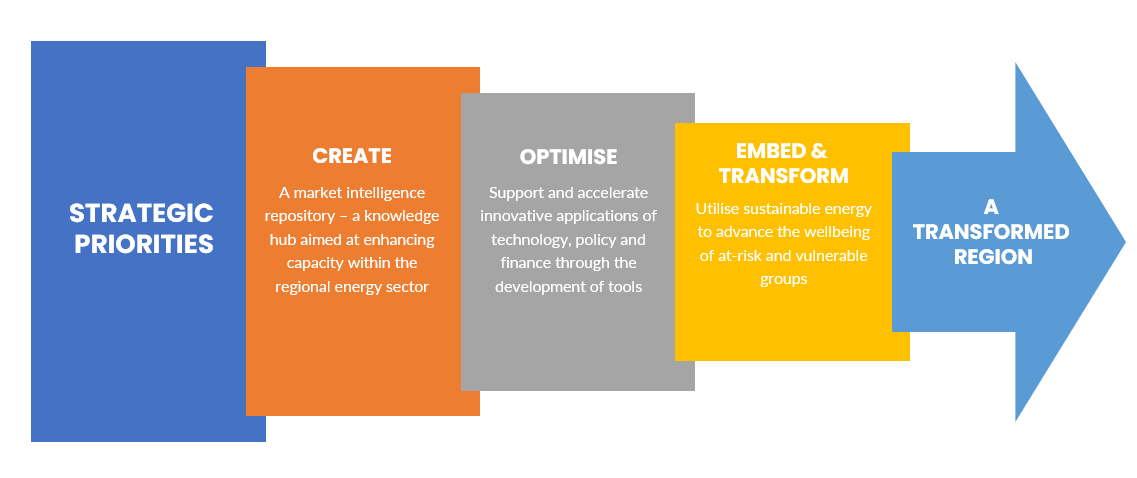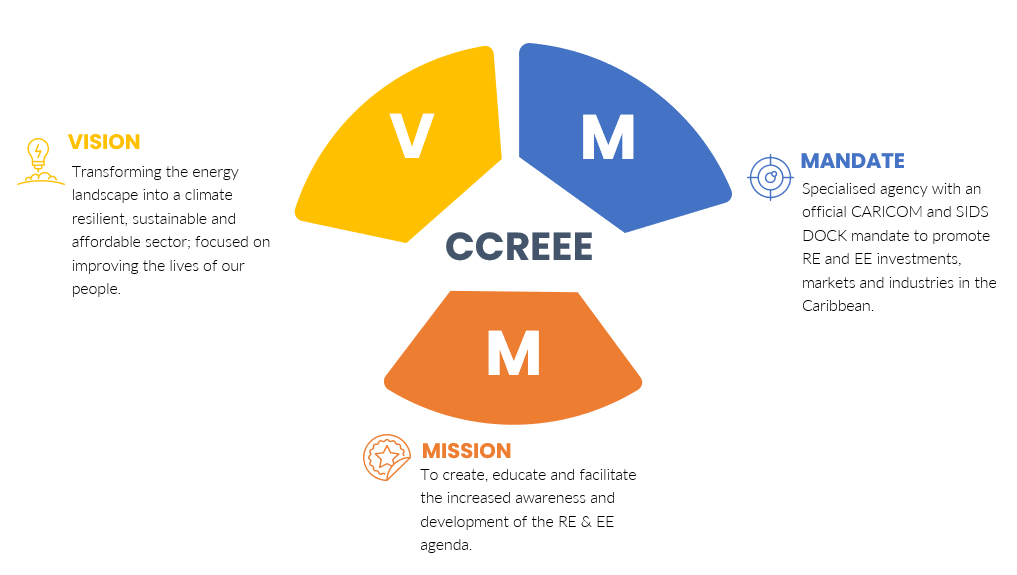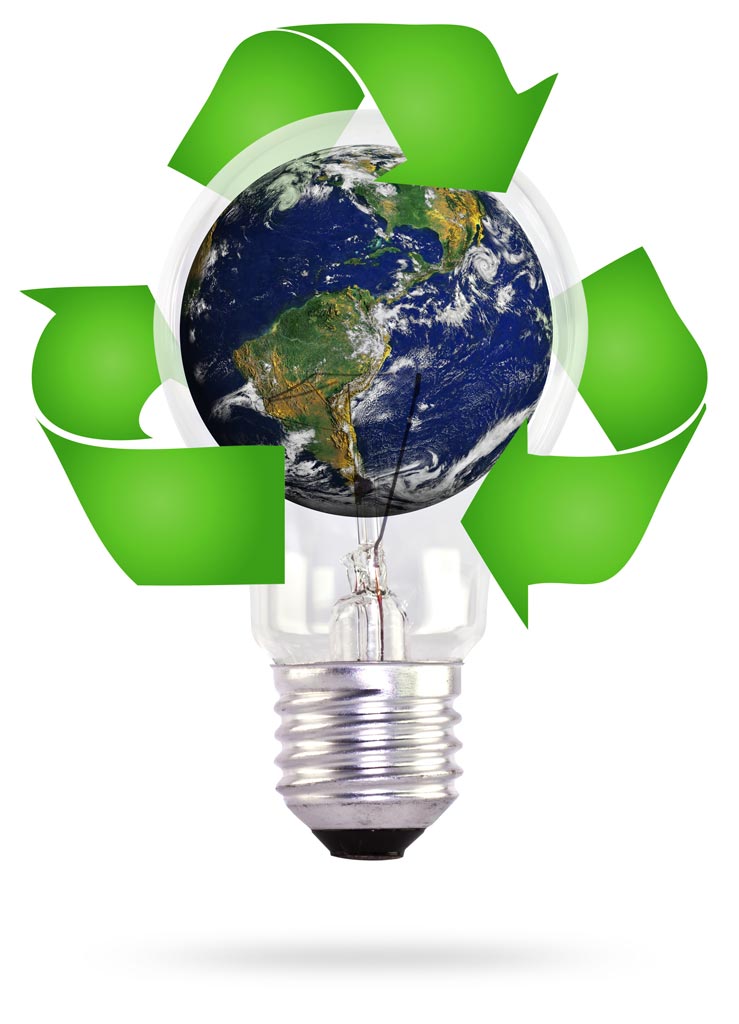ABOUT US
Objectives, Mandate and Alignment
Development Objective
The CCREEE is working to improve access to modern, affordable and reliable energy services, energy security and mitigation of negative externalities of the energy system (e.g. local pollution and GHG emissions) by promoting renewable energy and energy efficiency investments, markets and industries in the Caribbean. The CCREEE’s strategic priorities are to create, optimise, embed and transform the energy sector, resulting in a transformed region.

Mandate and Operations of the CCREEE
The CCREEE is a specialized agency with an official CARICOM and SIDS DOCK mandate to promote
renewable energy and energy efficiency investments, markets and industries in the Caribbean. The CCREEE has a technical mandate and provides action and service-oriented services to a broad range of public and private partners and clients. The Centre partners with the Energy Programme of the CARICOM Energy Unit and CARICOM Member States in the technical implementation of sustainable energy commitments on common SIDS sustainable energy issues and solutions.
The Centre operates within the decision and policy framework of CARICOM however, the Centre enjoys full autonomy and operates according to its own administrative and financial rules and procedures. The day-to-day management and decision-making authority is delegated to the Executive Director and the Executive Board and, under the SIDS DOCK framework, the Centre works closely with the ECOWAS Centre for Renewable Energy and Energy Efficiency (ECREEE) and the Pacific Centre for Renewable Energy and Energy Efficiency (PCREEE)

The geographic scope of intervention of the CCREEE is defined as follows:
- Supports and executes renewable energy and energy efficiency activities and projects which cover one or more CARICOM Member States (Antigua and Barbuda, The Bahamas, Barbados, Belize, The Commonwealth of Dominica, Grenada, The Cooperative Republic of Guyana, The Republic of Haiti, Jamaica, Montserrat, Saint Kitts and Nevis, Saint Lucia, Saint Vincent and the Grenadines, Suriname and The Republic of Trinidad and Tobago);
- Focuses primarily on activities and projects with regional impact or national projects which demonstrate high potential for scaling-up or regional replication;
- Works in urban and rural areas due to the high relevance of decentralized renewable energy and energy efficiency technologies and services for rural areas linked with the agricultural sector.
The Centre promotes the following energy technologies/solutions:
- All appropriate and sustainable renewable energy and energy efficiency technologies, including also partly renewable energy-based hybrid systems and mini-grids. The centre will also consider important cross-cutting issues such as mainstreaming of environmental assessments and standards in project planning and approval procedures, the energy-water-food nexus, gender mainstreaming, the decommissioning and recycling of renewable energy and energy efficiency technologies (e.g. light bulbs, wind turbines);
- Geothermal due to the region’s high potential to generate significant quantities of energy and the diverse obstacles member states are facing to promote this resource;
- Waste-to-energy solutions to mitigate the environmental issues caused by urban and agricultural wastes, especially in the island states;
- Small and medium-scale hydro power projects usually with a maximum capacity of 30 MW;
- Biofuel projects which prove to be sustainable. In this context, CCREEE considers 2nd generation biofuels not competing with food crops for available land, complying with the following minimum criteria: lifecycle GHG reductions, including land use change, local added value, ecological and social standards.
 Alignment with Wider Sustainable Energy and Climate Policy Objectives:
Alignment with Wider Sustainable Energy and Climate Policy Objectives:
The CCREEE’s activities contribute to and are fully aligned with the following sustainable energy and climate policy objectives:
- The SIDS DOCK objectives to improve energy efficiency by 25 percent (2005 baseline), to increase the renewable energy share in power generation to a minimum of 50 percent and to reduce fuel use in conventional transportation by 20-30 percent by 2033;
- The goal of CARICOM’s Energy Policy which aims at assuring access to affordable, adequate, safe and clean energy products necessary for the development of CARICOM Member States;
- The CARICOM renewable energy and energy efficiency targets which were approved in the 41st Special Meeting of COTED based on the Caribbean Sustainable Energy Roadmap and Strategy (C-SERMS): 20 percent renewable power capacity by 2017, 28 percent by 2022, and 47 percent by 2027; a 33 percent reduction in energy intensity by 2027; and power sector CO2 emission reductions of 18 percent by 2017, 32 percent by 2022, and 36 percent by 2027;
- The objectives of the 2015-2019 Strategic Plan of CARICOM adopted by the Heads of Government in their Thirty-Fifth Regular Meeting held in Antigua and Barbuda, from 1-4 July 2014;
- The Centre contributes particularly to the cross-cutting areas of the Sustainable Development Goals (SDGs), particularly Goal 7 on affordable and clean energy and Goal 9 on sustainable industrial development. The Centre also indirectly contributes to several other SDGs, including Goals 3, 5, 6, 8, 10, 11, 12, 13, 15 and 17. It closely partners with the UN Sustainable Energy for All Initiative (SE4ALL) which aims at the three interlinked targets by 2030: universal access to modern, affordable and reliable energy services; doubling the global rate of improvement in energy efficiency; doubling the share of renewable energy in the global energy mix;
- The centre works towards limiting the average global surface temperature increase below 2°C or 1.5°C above pre-industrial levels in line with the reached global climate agreement at COP21 in Paris.
Sustainable Development Goals (SDGs)
While the CCREEE’s work directly contributes to the SDGs highlighted below, it is through the enactment of the goal 17 – partnerships for the goals – that we are connected to all Sustainable Development Goals. We think globally, implement regionally – with the help of our National Focal Institutions, Thematic Hubs, Core and Strategic Partners – and, act locally.










 Alignment with Wider Sustainable Energy and Climate Policy Objectives:
Alignment with Wider Sustainable Energy and Climate Policy Objectives: